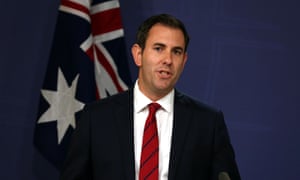Record jobs numbers belies low wages growth, 730,000 unemployed and rising use of labour hire, says shadow finance minister
With labour law experts warning that businesses are increasingly avoiding collective bargaining agreements with their workers by outsourcing to labour hire companies with non-union agreements, Labor said it was now prepared to consider legislative changes if it won government to make working conditions fairer.
With parliament due to return on 5 February, the treasurer, Scott Morrison, said the Coalition would keep pushing to legislate its $65bn tax cuts as a way to boost economic growth.
But Chalmers said the government had to stop fixating on tax cuts for big business and start focusing on deteriorating wages and working conditions.
“There’s no question that there are some practices that are emerging that are undercutting people’s wages and conditions,” Chalmers said on Sunday about businesses increasingly resorting to labour hire.
“[And] Malcolm Turnbull and Scott Morrison are so out of touch that they want a round of applause when we have 730,000 Australians out of work and, for those in work, we have record low wages growth and more precarious working conditions as well.
"We won’t get the growth we need by showering largesse on the top end of town at the expense of middle Australia"
“We won’t get the growth we need in this economy by showering largesse on the top end of town at the expense of middle Australia and somehow expecting it to miraculously trickle down to those who work and struggle.”
Morrison said Labor never had anything positive to say about the economy.
He said, correctly, that 403,100 jobs were created last year – the largest absolute increase in jobs in a calendar year since 1978.
“That is great news for the hundreds of thousands of Australians ... who were able to get out there and find a job,” Morrison said. “We commend all the businesses that were out there making those jobs last year.”
He said parliament would be asked to vote on the government’s multi-billion dollar tax cut legislation when parliament returns this year.
When asked on Sunday about the problem of underemployment, Morrison did not answer the question directly.
He said the participation rate increased in 2017 to a level not seen since 2011, and that meant employers and workers were becoming increasingly optimistic.
The Australian Council of Trade Unions cited two examples of what it described as a pattern of “heavy-handed” employer responses to industrial action. In January workers at Glencore’s Oaky North site marked six months since they were locked out and management at Port Kembla locked out members of the Construction, Forestry, Mining and Energy Union in January last year for about a week.
In a speech in November, the shadow workplace relations minister, Brendan O’Connor, said Labor would “legislate to make clear that the workers who vote on an agreement must be representative of the workers who may ultimately be covered by [it]”.
He has said Labor was “looking at a whole array of issues in bargaining, including workers’ and employers’ ability to take [protected industrial] action”.

No comments:
Post a Comment